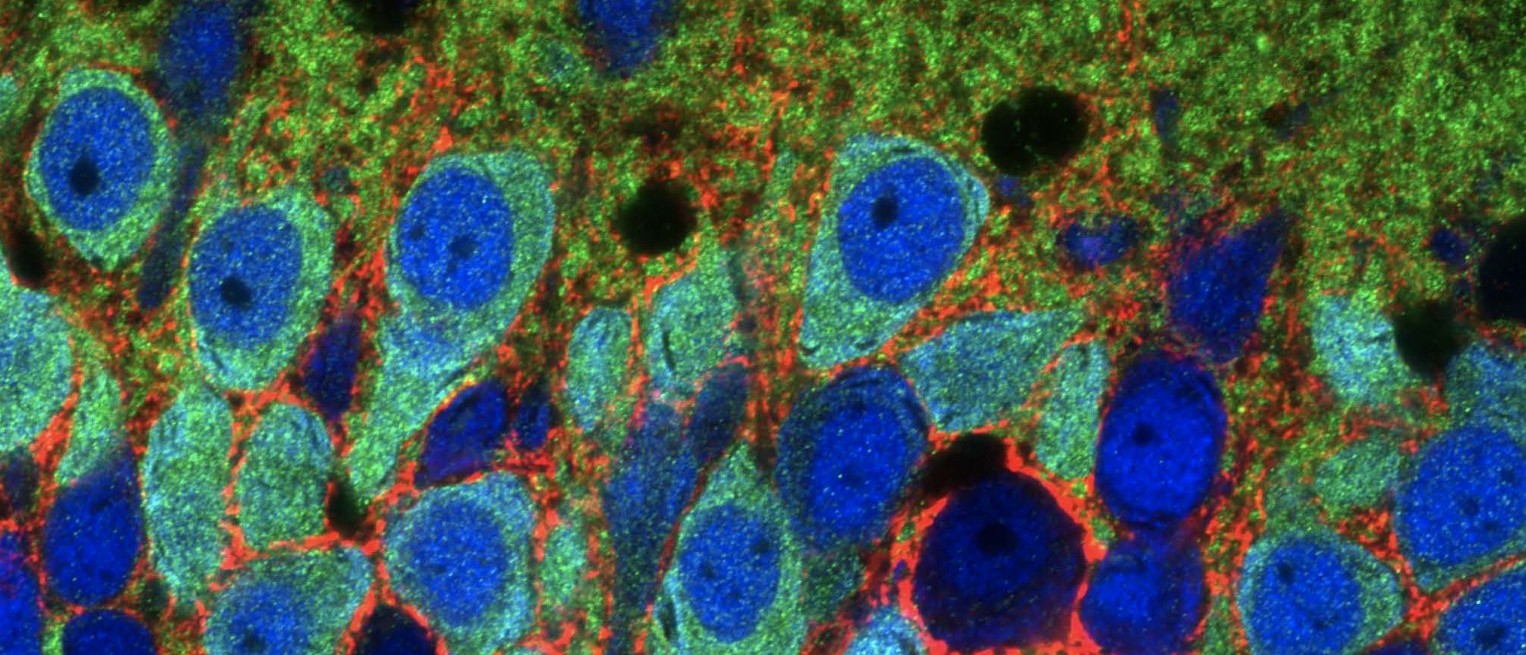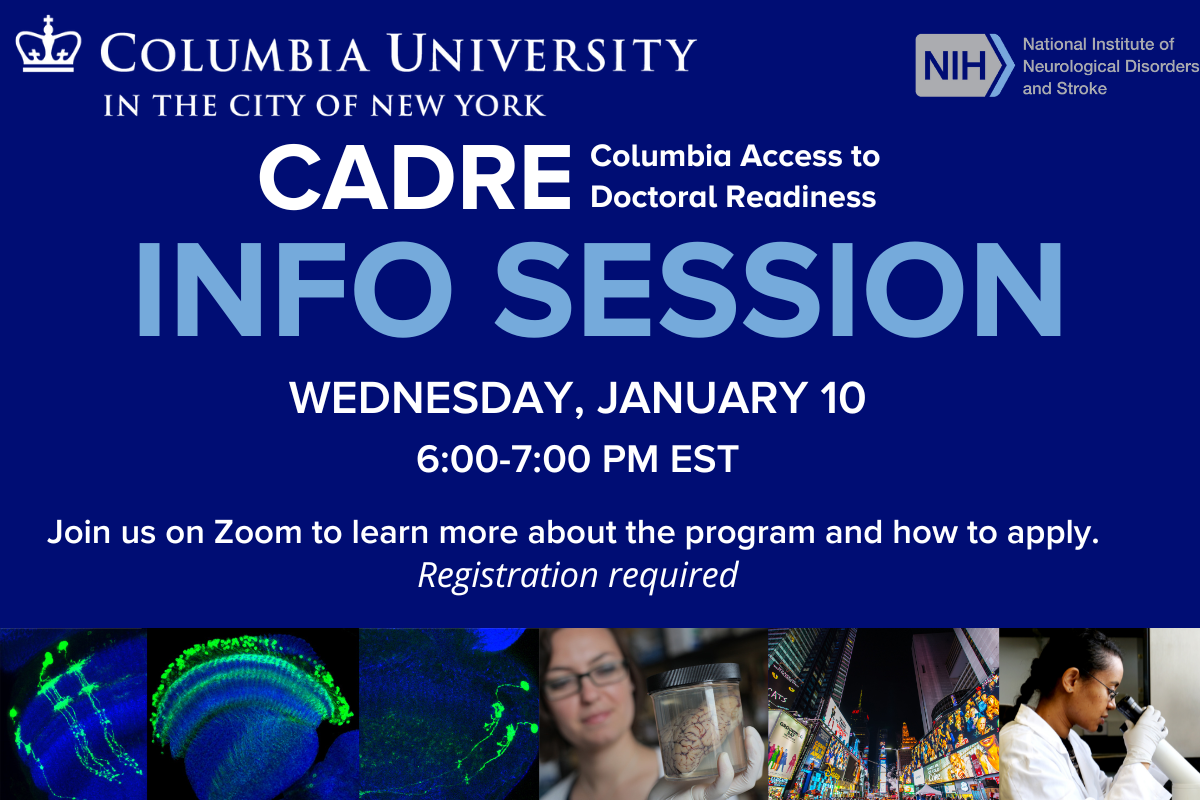Columbia Access to Doctoral REadiness (CADRE) Post-Baccalaureate Program
Columbia Access to Doctoral REadiness (CADRE) is a comprehensive two-year post-baccalaureate (‘postbac’) research program, funded by NINDS. It is intended for recent college graduates of high potential who are interested in pursuing a research career in neuroscience but lacked access to research opportunities as undergraduates.
The core of CADRE is a two-year research project advised by selected mentors. Postbacs will choose a lab from a range of neuroscience areas including behavioral and systems neuroscience, cellular, molecular and developmental neuroscience, computational neuroscience, human cognitive studies, and the neurobiology of neurological diseases. They will be supervised by engaged and enthusiastic mentors chosen for their mentoring track record and skills, as well by a graduate student peer mentor in the lab. The postbac’s research project will also be complemented with coursework to strengthen their academic foundations, though coursework is not the primary focus of the program. In addition, throughout the program, postbacs will attend seminars, lectures, and other educational events around Columbia University.
Applications are now open and close January 31, 2024.
Interested in applying to the CADRE program?
Check out the recording from our info session that we hosted in early January 2024! In this info session, interested applicants got to hear from current scholars and program administrators about the application process, interview process, and what you can kind of experience you might have if accepted into the program.
To stay up to date on updates from our program, sign up for our listserv here.
Meet our 2023-2025 CADRE cohort!
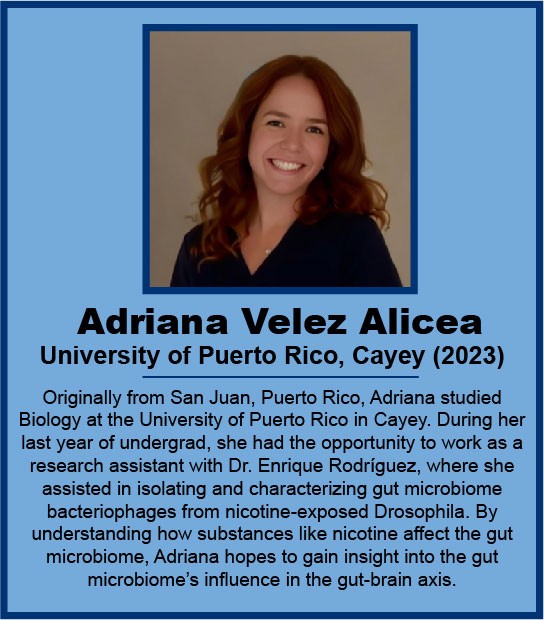
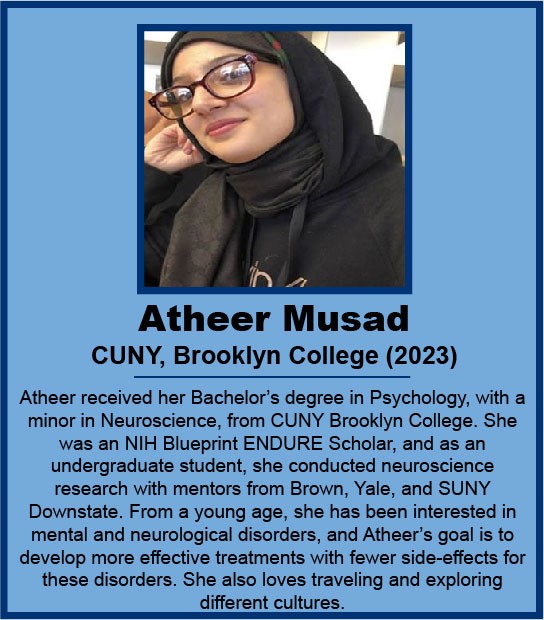
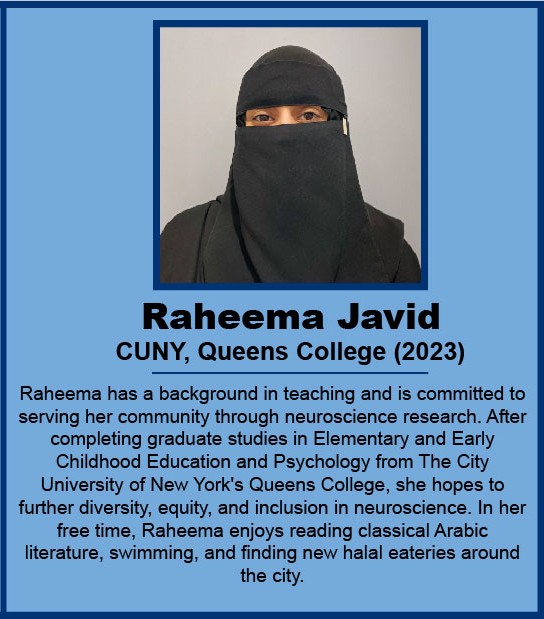
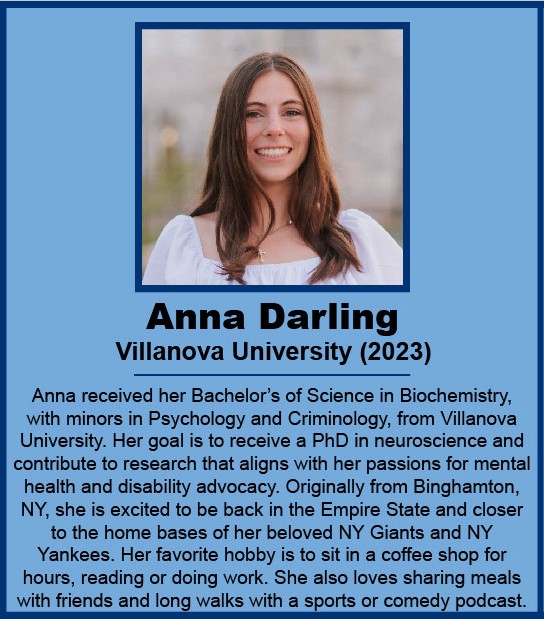
The CADRE Program is committed to training a diverse group of neuroscientists from a broad range of ethnic, cultural, educational, and socioeconomic backgrounds.
This program is designed to exclusively support individuals who graduated from undergraduate institutions that did not provide an opportunity for research involvement that would be equivalent to that available at Research I institutions.
We will be able to accept 4 CADRE students per year.
Eligibility requirements
- Must be a U.S. citizen, a noncitizen national of the U.S., or have been lawfully admitted for permanent residence.
- At program start (Summer 2024), applicants must have received their baccalaureate degree in a biomedically relevant science from an accredited college/university.
- Applicants cannot be enrolled in a degree-granting program when the CADRE program begins. If the degree is forthcoming but not yet in hand because of the timing of baccalaureate degree conferral then a letter to that effect is required from the registrar or equivalent official.
- Importantly, the baccalaureate degree MUST be from an institution that did not provide opportunities for a strong biomedical research experience.
- Applicants who obtained their baccalaureate degrees from institutions offering doctoral degree programs in neuroscience-related biomedical sciences are NOT eligible.
- The baccalaureate degree must have been awarded no more than 36 months (i.e. 3 years) prior to applying to this program. There are some exceptions to this limit:
- Parental, medical, or other well-justified leave for personal or family situations is not included in the 3-year eligibility limit.
- National service (e.g. Peace Corps, or service in Armed Forces Reserves or National Guard) also does not count toward this 3-year limit.
- Applications from individuals from backgrounds under-represented in the sciences are especially encouraged
- We recognize that you may not know if your institution and/or your degree major fit these criteria. For example, a major in math is relevant for theoretical neuroscience, and therefore would be relevant for this program. If you are unsure about whether you meet these eligibility criteria, you are welcome to still apply, or ask us a question by emailing [email protected]
Applications for the 2024-2026 cohort are now open. Please find the link for the application here.
Applications are not considered complete until we receive your letter of recommendation, submitted directly by your recommender. Please provide them with this link to upload it before January 31, 2024.
Join us on Wednesday, January 10, 2024 from 6:00-7:00 pm to hear from current scholars and program administrators about the application process, interview process, and what you can kind of experience you might have if accepted into the program. Registration is required here.
Required components:
- Basic, demographic, and contact information
- Undergraduate transcript (unofficial or official transcript accepted)
- Resume / CV (2 pages maximum)
- List three (3) areas of neuroscience that interest you
- Essay question: a research question that interests you (1 page maximum)
- Personal statement (2 pages maximum)
- One (1) letter of recommendation (2 pages maximum; can be from a professor, a mentor, advisor, a job supervisor, etc.) Must be submitted directly by the recommender via a qualtrics link shared with applicants.
Pagination instructions: all page limits are based on the use of 1.5 spacing, 0.5" margins, and Arial 11-point font (or Times New Roman 12-point font)
Components 2-3, and 5-6, as well as the letter of recommendation should be uploaded in PDF format.
What we look for in the application:
- Interest in pursuing a career in neuroscience research
- Excellence in a student’s chosen undergraduate major
- We recognize that the first year of college can be especially challenging and also that personal circumstances can impact academic performance (especially during pandemics). All extenuating circumstances will be taken into consideration. You may include these circumstances in your personal statement if you are comfortable doing so, or reach out to a program Co-Director.
- Taking courses in neurobiology, and related biomedical science courses is encouraged even if you have not majored in the subject. We recognize that each school may not offer the same variety of courses.
- The CADRE program is an intensive research experience and students should enter with a mature view of the commitment involved.
- Applicants should treat this program as a full-time research job
Columbia Access to Doctoral REadiness (CADRE) is a comprehensive two-year post-baccalaureate (‘postbac’) research program. As such, we provide students with the following:
- Pay: approximately $44,400 per year + benefits
- Full-time research experience with mentorship from faculty and peers
- Workshops and courses on rigorous research and neuroscience topics
- After 7 months from start date, postbacs can enroll in Columbia courses for credit for free
- Support in applying for graduate programs or jobs toward the end of the program
Unfortunately, we are unable to provide housing, but accepted students will receive resources for finding housing in NYC.
December 2023: Application Opens
January 31, 2024: Application Deadline (Late applications will not be accepted)
Late February/Early March 2024: Virtual interviews for selected applicants with CADRE staff and potential research mentors
April 2024: Decisions announced
Summer 2024: Program starts (Cohort II)
Summer/Fall 2025: Cohort II students apply to graduate school and/or jobs
June 2026: Program ends (Cohort II)
Dr. Wes Grueber, CADRE Co-Director, Professor of Physiology and Cellular Biophysics and Neuroscience; Principal Investigator at Columbia's Zuckerman Institute
Dr. Ulrich Hengst, CADRE Co-Director, Associate Professor of Pathology and Cell Biology (in the Taub Institute for Research on Alzheimer's Disease and the Aging Brain)
Dr. Aniruddha Das, CADRE Associate Director, Associate Professor of Neuroscience; Principal Investigator at Columbia's Zuckerman Institute
Ms. Alissa Mayers, CADRE Administrator, Director of Public Programs at Columbia's Zuckerman Institute
Ms. Ivy Elkins, CADRE Administrator, Scientific Programs Manager at Columbia's Zuckerman Institute
Have questions about the CADRE program?
You can reach us by emailing [email protected]
Interested in receiving announcements about CADRE?
Sign up for our listserv here. You can unsubscribe at any time.
Current undergraduates from underrepresented groups who are interested in summer research opportunities should consider the SPURS program.
Advanced undergraduates from underrepresented groups who are interested in applying to PhD programs should apply to Columbia Access Neuroscience (CAN).
Columbia's Bridge to the Ph.D. Program in STEM is a post bac program that is designed to increase the participation of students from underrepresented groups in Ph.D. programs in STEM disciplines.


